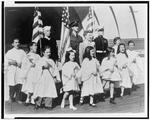The Best Actress of the 20th century?
That's been an ongoing e-mail debate among our readers for nearly a year. At first we weren't going to touch it. We'd named the movie stars of the second half of the 20th century and offended a number of readers (and two of C.I.'s friends who were upset that they weren't named). So we weren't interested.
Except it coming up.
Over and over.
And if we narrowed it down to those who are dead and just zoomed in on the first half of the 20th century, it was a brief list.
In no particular order, the readers of this site felt the best film actress was Loretta Young or Joan Crawford or Katharine Hepburn or Carole Lombard or Bette Davis or Clara Bow or Mae West or Ingrid Bergman or Marilyn Monroe or Audrey Hepburn or Barbara Stanywick or . . .
Zooming in on the first half of the 20th century seemed like something we could do.
And it quickly came down to two women: Bette Davis or Katharine Hepburn?
Davis won two Academy Awards for Best Actress, Hepburn won four.
That would seem to settle it, Hepburn wins . . .
Except it's not about awards.
And, if it were, Hepburn would still be the loser. Three of her awards come after she's a parody of herself (starting with the 1967 award for Guess Who's Coming To Dinner). And while an argument can be made that she deserved the Academy Award for 1940's The Philadelphia Story, that's really the only time she was nominated and lost that can be considered an injustice.
Bette Davis?
All this time later does anyone really believe the best performance from 1950 wasn't her turn in All About Eve? That it was Judy Holliday in Born Yesterday? Holliday's a charming comic actress but that's not a best actress role (nor has the film held up). Davis' work in 1939's Dark Victory was as strong as Vivian Leigh's in Gone With The Wind. Her work in 1940's The Letter was far, far superior to non-actress Ginger Rogers and the embarrassing Kitty Foyle. 1941's The Little Foxes performance was stronger than Joan Fontaine's in Suspicion. 1942's Now Voyager was far superior to the hammy theatrics of Greer Garson in Mrs. Minerva.
We're not attempting to say that Katharine Hepburn had no talent. Certainly any actress who lived as long as she did and convinced so many that she was interested in men should be awarded a Best Closeted Oscar or two or three. But the fussy, prissy Hepburn was only believable in that one role. And she played it over and over and became fussier and fussier. People (wrongly) slammed Doris Day for virginal roles when Hepburn's the one who so often played it as if her 'maidenhead' was the her most prized possession.
With the start of the 1950s, she'd play one emotional cripple after another, still with all the fluttering mannerisms and apparently all emotional cripples are exactly the same -- at least when portrayed by Hepburn. There's something very sad and very perverse about about her role in The Rainmaker -- at 49-years-old, you'd think both she and her father would stop worrying about marrying her off. After 1950, Hepburn delivers one solid performance and only one solid one: Desk Set. Joan Blondell (and the script) force her to go beyond the usual mannerisms and she plays drunk delightful.
But the bulk of her films after 1950 were all about her mannerisms and fluttering (Spencer Tracy was correct to verbally attack her for them) as they increased and increased until, by the time she's performing On Golden Pond, you wish someone would drown her in the lake. She won an Academy Award for . . . her pedigree. Not for the performance. She's dreadful in the film. She marvels over Jane Fonda's character as if she's her lover, not her daughter (watch when Fonda's doing the dive into the lake). She has no connection with Henry Fonda and tends to interact with him onscreen as though he were her agent and not her husband. (Contrast Hepburn's bad performance with the excellent one Diane Keaton gave in Reds and you'll know who should have won the Academy Award for Best Actress that year.)
She became more and more of a joke with each role in her last years and, by 1967, she was already a joke. While Hepburn played herself in film after film, Bette Davis created characters. It was that desire and talent that made her a star, that made her fight to get the lead in Of Human Bondage when every other actress ran from the part. Bette Davis leaves behind some of the most fully realized characters onscreen: Margo Channing, Mildred, Gabby, Julie, Judith, Regina, Charlotte and, yes, Baby Jane.
Hepburn had a 'pedigree' -- that's what the press told you repeatedly. Worst in their attempts to shore up her non-performance in On Golden Pond. Well what did that get her? Joan Crawford started out with nothing and Joan Crawford created more memorable and varied characters than did Hepburn.
There's a place for The Philadelphia Story, Bringing Up Baby, Desk Set and a few others in film history. But let's not confuse Hepburn's limitations and sameness with acting. As Dragon Seed and The Sea of Grass so perfectly demonstrated, this was an 'actress' who couldn't stretch. Dorothy Parker infamously said of Hepburn's performance in Jed Harris' The Lake, "Katharine Hepburn delivered a striking performance that ran the gamut of emotions, from A to B." Parker was a wit because wit requires truth and she remains the critic who best captured what Hepburn offered.
